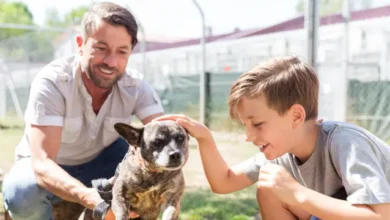Tips for Understanding Dog Behavior: For New Pet-Parents

MixbreedDogs.com is an Amazon Associate, and we earn from qualifying purchases.
The great amount of excitement that comes with adoption or buying a pet dog also comes with a lot of responsibilities. You really have to become a caring parent to your new pet-child. Besides the initial training and common food queries that trouble our mind, your mind gets puzzled by abrupt mood-shifts or unusual behaviors demonstrated by your dog.
One of the most important rules of new and quality relationship is “developing an understanding”. Dogs are no exception!
Here, I will familiarize you with some tricky dog behaviors and their causes so you can better connect with your cute little pet-child. Fun doubles once you begin to understand your companion.
1. Skipping Meals:
Being a new Pet-parent can be a hell of a job! Selecting the best dog food and making sure that your dog is gaining enough nutrients is one of the first steps.
But, what if your dog begins to skip meals? Even though few dogs love to munch on food all the time, but some may like to eat less and skip the dinner. Few dogs eat less on hot summer days and others may refuse to eat only to have their favorite meals all the time. It may be feeling a stomach ache. So, it’s entirely normal. However, you need to consult a vet if your dog continues to skip meals.
Read More: Beagle Pitbull Mix – Is This Cross Right for You?
2. Excessive Skin Scratching:
You might have seen other pets commonly scratching themselves, but it’s something that we should not ignore as dogs face a variety of skin problems.
Firstly, understand that the dog is not allergic to the food or any supplement you are feeding it. Dig deeper into the proper nutrition needs of your dog.
Secondly, find out if your dog is allergic to grass or smoke or any other environmental factor.
Thirdly, look for fleas or ticks in the coat fur of your dog because they commonly trouble dogs.
Once you rule out these three factors and still the problem persists, get an appointment with your vet. Dogs often get viral, bacterial or yeast skin infections and allergies.
3. Aggressive/Shy Behavior:
Aggressive behaviors are associated usually with environmental stimuli, but that’s not the case always. Dogs can be aggressive because of the genetically inherited trait. So, keep the fact at the back of your mind, if all else fails just accept the behavior and stop reacting.
Shyness isn’t always due to environmental stimuli of being bullied or aggressively treated. Shy behaviors are often caused due to age factor, that is, adolescence period at 12 to 18 months of age or growing-up time span of 4 to 6 months of age.
4. Dominating Behaviors:
Dogs that sit at high places, pull at the leash, try to lead you or enjoy your sofa without your permission are misinterpreted into “trying to dominate” category. They are reflective of what we are giving them. So, get flexible and fun-loving during the training process to make them comfortable with you. Use positive reinforcements for desired behaviors all the time. Not a big trouble so cheers!
5. Separation Anxiety:
“Dogs are pack animals” is oft-repeated and highly-emphasized fact. So, separation from owner or other dogs creates anxiety in them. Leave them infrequently at first and for shorter time periods so that they understand your routine of ‘always coming back’. Yes! Once they are trained to wait for you, they will learn to engage themselves.
However, keep the difference between true separation anxiety and simulated separation anxiety (which dog adopts only to get your attention). In the former case, give proper time to them for playing and long walks and socializing them with other dogs and people. Avoid getting them habitual to crowds because that will aggravate the situation once you leave your home. In latter case, try to say ‘no’ to their simulated pleads.
7. Inactivity:
Dogs need regular physical exercises like chase-it or go-fetch games, running on tracks and long walks to parks to socialize and move around. Mental exercise requires them to learn new tricks, find their food or gather the mess they created. If your dog isn’t responding to both stimuli of exercises, they may be suffering from some health issue. If not, then, just keep them busy hunting for stuff.
8. Barking:
For new pet parents, developing an understanding of the reason behind dog barking can get tricky initially. They may bark to get your attention or when there’s a danger or when they are hungry or when they want to play. They communicate with you their emotions and misinterpreting or ignoring them at such moments is never a good idea. However, by paying attention to them every time they bark may positively reinforce them to ‘always get your attention easy way out’. It can get irritating at later stages.
So, draw some lines in the beginning and be consistent in your behaviors with new dog-child. Understand, accept and have more fun each day with your lovely pet.
AUTHOR BIO:
Fiona Appleton is a Labrador-lover. She is the manager of ultimatehomelife.com to help people solve the troubles of pet keeping. She is the active advocate of animal protection campaigns. She wants people to understand that dog-behavior is reflective of our behavior and we need to understand them at deeper psychological levels.
Related Posts:
https://www.petdogplanet.com/teddy-bear-dog/
https://www.petdogplanet.com/short-legged-dog/
https://www.petdogplanet.com/most-trainable-dogs/
https://www.petdogplanet.com/velcro-dog/



